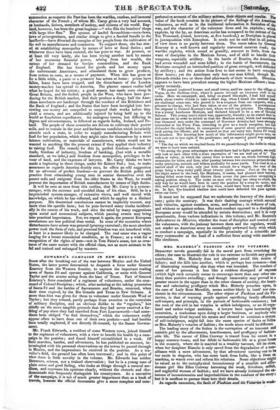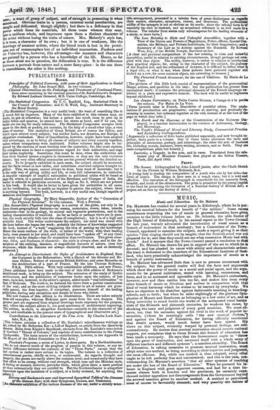MRS. MABEELY'S PASIIION AND ITS VOTARIES. DIDACTIC novels generally fail
in the moral part from overdoing the ethics; the case to illustrate the rule is too extreme to furnish any general conclusion. Mrs. Maberly does not altogether avoid this scarce of failure; and she falls into another, which is perhaps less common—that of illustrating something else than what was intended. The conduct of some of her persons is less like a reckless disregard of expense (which high rank certainly seems to encourage more than any other sta- tion) than positive swindling; and though immorality may prevail to a greater extent in the upper than in the other classes of society, the heart- less and calculating profligacy which Mrs. Maberly preaches upon, in the case of Lady Rose Meredith, seems neither likely in itself nor con- sistent in the circumstances. The other object of Fashion and its Vo; taries, is that of warning people against sacrificing family affections, self-respect, and principle, in the pursuit of fashionable eminence; but the root of the evil in her votaries is selfish indulgence, or an ill-regu- lated and rather vulgar ambition. A lawyer bent upon increasing his connexion, a tradesman upon doing a larger business, or anybody who systematically lived beyond his means and cheated to continue a system of self-indulgence, might fall into the same species of faults or follies as Mrs. Maberly's votaries of fashion; the mode alone would be different. The leading story of the fiction is the corruption of an innocent and amiable girl by the allurements, heartlessness, and profligacy of fashion- able life. The career of Ellen Conway is traced from its outset in a happy country-home, and her debat in fashionable life at a great house in the country, where she is married to a wealthy baronet, till its 0100ei when her daughter Blanche is only saved from the degradation of a mes- alliance with a mere adventurer, by that adventurer turning out to be her uncle in disguise, who has come back from India, like a Deus ex machine, to watch over and reform his relations. Some objections might be raised as to the metaphysical inconsistency of a sensible and affee• tionate girl like Ellen Conway becoming the weak, frivolous, selfish, and neglectful woman of fashion ; and we have already intimated the ex- istence of inconsistencies and improbabilities in the cond Oct of the store; but it is needless to pursue them into their details. As regards execution, the fault of Fashion and its Votaries is weak- ass; a want of grasp of subject, and of strength in presenting it when conceived. Obvious traits in a person, external social peculiarities, are caught and delineated, though slightly ; bat there is a deficiency in that power which fuses its materials, let them come whence they may, into a uniform whole, and impresses upon them a distinct character of the artist without losing the traits of nature. Mrs. Maberly's style has, it is true, a character of its own ; but it is one of weakness, like the drawings of amateur artists, where the literal truth is lost in the pretti- ness not of commonplace but of an individual mannerism. Fashion and its Votaries has, however, this advantage—the manners and characters ere painted by a person who has a knowledge of the life. Hence, so far as these alone are in question, the delineation is trite. It is the difference between a portrait from nature and a mere fancy-piece : in the one there is resemblance, the other is like nothing.



























 Previous page
Previous page